What s Your Risk Tolerance
Post on: 16 Март, 2015 No Comment

The stock market is a great investment if you discover just how much risk you can tolerate.
Part 6 of our series on the stock market.
Determine Your Risk Tolerance
Each individual has a risk tolerance that should not be ignored. Any good stock broker or financial planner knows this, and they should make the effort to help you determine what your risk tolerance is. Then, they should work with you to find investments that do not exceed your risk tolerance.
This article is not meant to be a lesson on investment strategy but simply to make you aware that there are many things to consider before you jump into investing without doing some investigation first.
Determining your risk tolerance involves several different things. First, you need to know how much money you have to invest, and what your investment and financial goals are.
For instance, if you plan to retire in ten years, and you havent saved a single penny towards that end, you need to have a high risk tolerance – because you will need to do some aggressive – risky – investing in order to reach your financial goal.
On the other side of the coin, if you are in your early twenties and you want to start investing for your retirement, your risk tolerance will be low. You can afford to watch your money grow slowly over time.
Realize of course, that your need for a high risk tolerance or your need for a low risk tolerance really has no bearing on how you feel about risk. Again, there is a lot in determining your tolerance.
For instance, if you invested in the stock market and you watched the movement of that stock daily and saw that it was dropping slightly, what would you do?
Would you sell out or would you let your money ride? If you have a low tolerance for risk, you would want to sell out… if you have a high tolerance, you would let your money ride and see what happens. This is not based on what your financial goals are. This tolerance is based on how you feel about your money!
Again, a good financial planner or stock broker should help you determine the level of risk that you are comfortable with, and help you choose your investments accordingly.
Your risk tolerance should be based on what your financial goals are and how you feel about the possibility of losing your money. It’s all tied in together.
Determine Where You Will Invest
There are several different types of investments, and there are many factors in determining where you should invest your funds.
Of course, determining where you will invest begins with researching the various available types of investments, determining your risk tolerance, and determining your investment style – along with your financial goals.
If you were going to purchase a new car, you would do quite a bit of research before making a final decision and a purchase. You would never consider purchasing a car that you had not fully looked over and taken for a test drive. Investing works much the same way.
You will of course learn as much about the investment as possible, and you would want to see how past investors have done as well. It’s common sense!
Learning about the stock market and investments takes a lot of time… but it is time well spent. There are numerous books and websites on the topic, and you can even take college level courses on the topic – which is what stock brokers do. With access to the Internet, you can actually play the stock market – with fake money – to get a feel for how it works.
You can make pretend investments, and see how they do. Do a search with any search engine for ‘Stock Market Games’ or ‘Stock Market Simulations.’ This is a great way to start learning about investing in the stock market.
Other types of investments – outside of the stock market – do not have simulators. You must learn about those types of investments the hard way – by reading.
As a potential investor, you should read anything you can get your hands on about investing…but start with the beginning investment books and websites first.
Otherwise, you will quickly find that you are lost.
Finally, speak with a financial planner. Tell them your goals, and ask them for their suggestions – this is what they do! A good financial planner can easily help you determine where to invest your funds, and help you set up a plan to reach all of your financial goals.
Many will even teach you about investing along the way – make sure you pay attention to what they are telling you!

You should definitely seek the services of a financial planner in order to help you get through those areas that are confusing to you or those that make you uncomfortable.
If you are still uncomfortable with certain types of investing after speaking with a planner, there is no specific reason that you must pursue any one course of investing over another.
It’s often the wiser course of action, but not necessarily the correct course of action, because you are likely to make mistakes out of nervousness rather than allowing the investment funds to do their job and make money for you.
Notice for Canadian readers.
There are references throughout this book on investing terms you may not be familiar with such as 401k, IRA, Keogh plans, etc.
These are simply retirement planning products for US citizens and if you talk to your financial planner, (if you don’t have one – do it now) he/she will explain the Canadian retirement planning products that are available to you.
If you like this report or any of our other reports,
please “Like” us, “Follow” us and/or make a comment.
Thanks for your support.
Statements and opinions expressed in these articles, reviews and/or other materials herein are those of the author, the editors and publishers.
While every care has been taken in the compilation of this information and every attempt made to present up-to-date and accurate information, we cannot guarantee that inaccuracies will not occur. Seniors Are Special Articles and Reports (Books 1 & 2) and Rod Jellison will not be held responsible for any claim, loss, damage or inconvenience caused as a result of any information within these pages or any information accessed through this site.
The content of any organizations and/or websites that you link to from Seniors Are Special Articles and Reports (Books 1 & 2) are entirely out of the control of Seniors Are Special Articles, Reports and Rod Jellison. You proceed at your own risk. These links are provided purely for your convenience. They do not imply Seniors Are Special Articles, reports and Rod Jellison endorse or imply association with any products, services, content, information or materials offered by or accessible to you at the organizations site.














